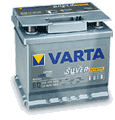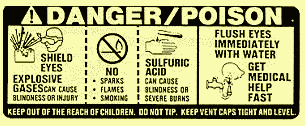Introduction
Modern leisure yachts have a steadily increasing number of electrical devices on board.
Some are essential for navigation and safety (radar, GPS, electronic log, radio, ...)
and some are improving the quality of life on board (water pumps, refrigerator,
audio system, ...).
When travelling under sails the primary source of energy for supplying these electrical
devices are the on-board rechargeable batteries.
 |
A rechargeable battery is only a storage element for electrical energy capable of
translating chemical energy into electrical energy (during discharging) and vice versa
(during recharging).
But a battery cannot "generate" energy: each Watt-Hour (Wh) that is taken from the
battery must have been stored in it before.
Although heavy and bulky, batteries are an efficient way to make electricity storable
and portable.
As complex active chemical systems, they are very sensitive to how they are used.
They are also sensitive to their operating environment, and even to how they
have been treated in the past.
|
The average lifetime of a standard lead-acid battery is only about 4 years.
A regular inspection of battery performance will be part of the safety checks on each
offshore sailing vessel.
An improved understanding of how batteries work should give a substantial bonus in
battery performance and in the reliability and longevity of the on-board energy system.
Safety
 Lead-acid batteries contain a sulphuric acid electrolyte, which is a highly corrosive poison.
It can cause blindness and severe skin burns.
Lead-acid batteries contain a sulphuric acid electrolyte, which is a highly corrosive poison.
It can cause blindness and severe skin burns.
Battery electrolyte mixed with salt water will produce chlorine gas that may KILL you
- even in small quantities!
|
Therefore, batteries should be handled with extreme caution:
- plenty of ventilation must be provided,
- protective safety glasses and clothing should be worn,
- battery liquid should be prevented from leaking in the environment,
- batteries must be handled only in a save environment: no sparks, flames or smoking!
Worldwide, stores that sell batteries will also take back old batteries for proper recycling.
|

 Lead-acid batteries contain a sulphuric acid electrolyte, which is a highly corrosive poison.
It can cause blindness and severe skin burns.
Lead-acid batteries contain a sulphuric acid electrolyte, which is a highly corrosive poison.
It can cause blindness and severe skin burns.